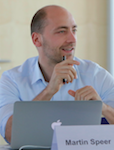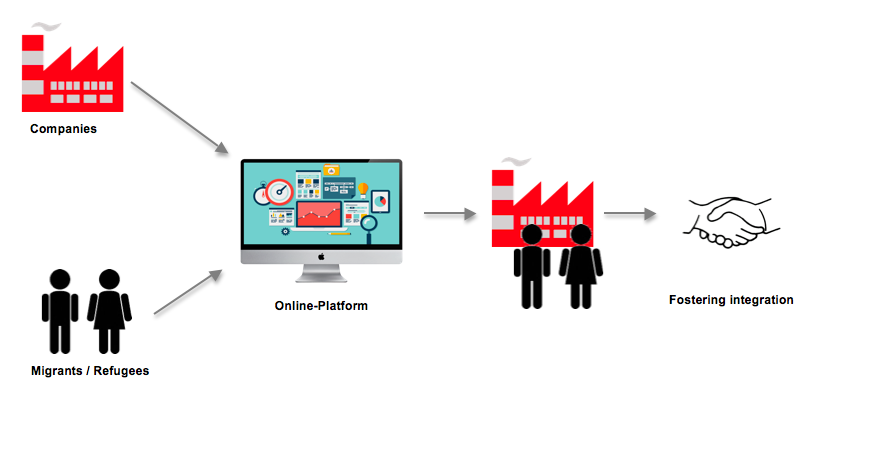In 2016, Europe continues to seek ways of how to best integrate large numbers of refugees. Successful integration largely depends on how well refugees can be incorporated into their new home countries’ economies. As legal and procedural obstacles often prevent a quick start in the labor force, other ways have to be found that allow refugees to utilize their skills, businesses to get in touch with prospective new employees, and for social bonds to be made. The following outline aims to overcome these hurdles and provide a way of including refugees into their new home societies from the get-go.
A Proposal by Vincent-Immanuel Herr, Kevin Müller and Martin Speer
The refugee situation is one of the most pressing political and social issues in Europe. Along with it comes a wide array of challenges and opportunities. The overall impact on societies will be determined by how well refugees as well as migrants are successfully integrated into their new homes. Certainly, integration has become a central factor that could help guaranteeing economic growth, social as well as political stability and peace. Any serious attempt to integrate new or prospective citizens will have to include a strong economic and labor component.
Even though many refugees arrive in their destination countries with labor qualifications, it still depends on their legal status whether they are allowed to join the labor market. In addition, bureaucratic hurdles can often decelerate access to a legal status and thus a job. The result is a large secluded refugee community unable to utilize their skills. This hampers successful integration and leads to a series of social and economic problems ranging from outright xenophobia, increased stress within refugee shelters to a complete waste of potential.
Refugees are legally prevented from starting any contract based work (e.g. regular jobs, internships, apprenticeships) until their asylum status has officially been verified – a process that could take up to several years. In 2015, EU countries offered asylum to 292,540 refugees. In the same year, more than one million migrants applied for asylum. Statistics show that Europe has to prepare itself to welcome as many as a million new refugees in 2016. Leaving the labor market integration to the system currently in place will not solve the problem. That is why our proposal offers a chance to all newcomers.
The First Bridges Program provides a platform that enables migrants to enter companies and businesses on a non-contract basis without creating any legal or other conflicts. Migrants can participate in the company’s work routines only by observing employees during their regular shifts and duties. In other words, the individuals will not actively take up employment.
The benefits of such a matching process for individuals are twofold. A job-observation-process will likely lead to better social integration, increased economic prospects and the sharing of knowledge. First Bridges fosters integration of migrants into domestic culture and society by connecting people. It’s no secret that personal relationships based on shared interest and skill sets are established through communal time at the workplace.
Secondly, First Bridges supports economic integration as it prepares refugees for possible future career paths. Once the refugee has attained a work permit, he or she may start working at the business or company they already know and are familiar with.
What’s in for Employers?
Depending on the design of this initiative, employers will benefit in different ways. Firstly, participating in the First Bridges Program will lead to increased social and brand recognition for companies. Some companies already successfully adopt the integration of newcomers into existing corporate social responsibility concepts. Besides, a government program could offer tax benefits or models of financial incentives to reward participating companies and businesses.
Furthermore, First Bridges allows companies to access the skills and experiences newcomers deliver that might help to improve production processes. This component of knowledge sharing and constructive feedback might actually increase the companies’ efficiency and market success.
Integration for Everyone
The inclusiveness and grassroots nature of this proposal will allow job observation for every level of education. The matching process can be successful for all types of jobs and is independent of education or age. A short-term job observation process can be carried out between two professors, two doctors, two pharmacists or two factory workers.
A key challenge might arise in the form of labor exploitation or mismanagement. Thus it is important that clear rules structure the oversight process at a company level. Preferably, this should be integrated into national labor and control mechanisms.
We are convinced that a matching process between refugees who just arrived and existing companies will advance social integration, economic participation and knowledge sharing. By facilitating personal meetings between new and established Europeans, stereotypes will be combatted and new friendships can be made.
The First Bridges Program was developed at the 2016 The Lab, a brainstorming and network-building event organized by the Friedrich-Ebert-Stiftung and moderated by Herr & Speer. Besides Müller, Herr, and Speer, eleven other young Europeans were part of the creative process and development of the idea.
The Polis Blog serves as a platform at the disposal of Polis180’s members. Published comments express solely the authors‘ opinions and shall not be confounded with the opinions of the editors or of Polis180. Image: The Authors.
 Vincent-Immanuel Herr (27) studied history, sociology, and politics in United States and Germany. He has worked on numerous research projects regarding European youth and integration, and published articles and op-ed pieces in German and international newspapers. He is currently starting an NGO in Berlin.
Vincent-Immanuel Herr (27) studied history, sociology, and politics in United States and Germany. He has worked on numerous research projects regarding European youth and integration, and published articles and op-ed pieces in German and international newspapers. He is currently starting an NGO in Berlin.
 Kevin Müller (27) has studied Politics, International Relations and Public Policy in London, Toronto and Berlin with a specialization on foreign policy analysis. Kevin has completed work placements in the parliamentary offices of the German Minister for Foreign Affairs, Dr. Frank-Walter Steinmeier, the High Representation of the Kurdistan Regional Government to the United Kingdom in London, and the Deutsche Gesellschaft für Internationale Zusammenarbeit (GIZ).
Kevin Müller (27) has studied Politics, International Relations and Public Policy in London, Toronto and Berlin with a specialization on foreign policy analysis. Kevin has completed work placements in the parliamentary offices of the German Minister for Foreign Affairs, Dr. Frank-Walter Steinmeier, the High Representation of the Kurdistan Regional Government to the United Kingdom in London, and the Deutsche Gesellschaft für Internationale Zusammenarbeit (GIZ).
 Martin Speer (29) studied economics and business in the United States and Germany. He started two businesses from scratch and has worked with several companies and firms on questions of economic feasibility and sustainable practices. Recently, his work focuses on European youth empowerment and inter-generational justice.
Martin Speer (29) studied economics and business in the United States and Germany. He started two businesses from scratch and has worked with several companies and firms on questions of economic feasibility and sustainable practices. Recently, his work focuses on European youth empowerment and inter-generational justice.
